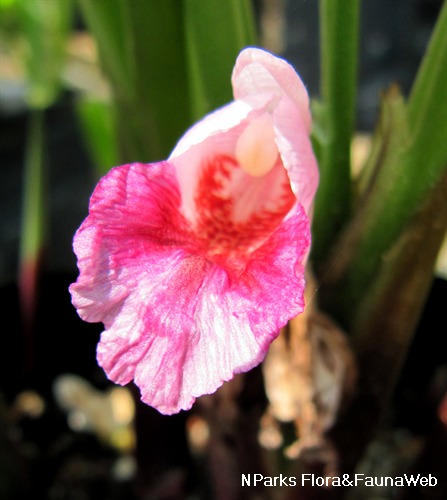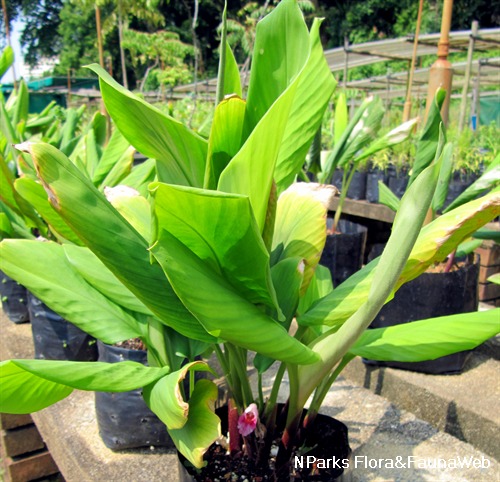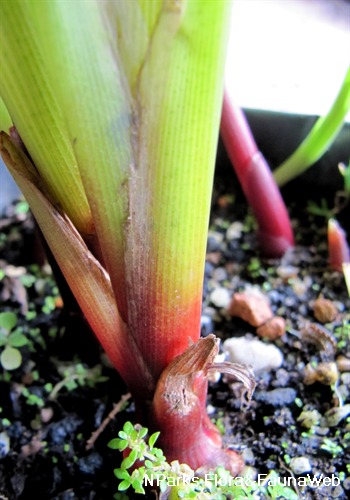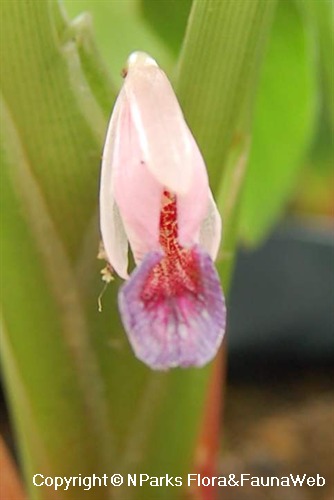
Back
Boesenbergia rotunda (L.) Mansf.
| Family Name: | Zingiberaceae |
| Synonyms: | Curcuma rotunda, Boesenbergia pandurata, Kaempferia pandurata |
| Common Name: | Fingerroot, Chinese ginger, Chinese key, 凹唇姜 |
Name
Classifications and Characteristics
| Plant Division | Angiosperms (Flowering Seed Plants) (Monocotyledon) |
|---|---|
| Plant Growth Form | Herbaceous Plant |
| Lifespan (in Singapore) | Perennial |
| Mode of Nutrition | Autotrophic |
| Maximum Height | 50 cm |
Biogeography
| Native Distribution | Assam to China and west Malesia |
|---|---|
| Native Habitat | Terrestrial |
| Preferred Climate Zone | Tropical, Sub-Tropical / Monsoonal |
Description and Ethnobotany
| Growth Form | Perennial herb forming clumps up to 90 cm tall. |
|---|---|
| Roots | Roots are tuberous and fleshy (5-30 cm long). |
| Foliage | Alternate, hardly fragrant when bruised; leaf sheath red, 9-19 cm long, together forming a short pseudostem; ligule 2-cleft, broadly triangular, up to 1.5cm long, arachnoid-pubescent, auricled (small earlike projection from the base of a leaf or petal); Leaf blade green on both surfaces, ovate-oblong to broadly lanceolate, 12-50cm x 5-17cm, glabrous, with several raised, parallel veins and scattered dots above, densely white dotted below. |
| Stems | The underground horizontal stem, known as the rhizome, is fragrant when bruised and shaped like a bunch of fingers, giving rise to its common name 'Fingerroot'. |
| Flowers | Inflorescence terminal on pseudostems, spike like, 10-15cm long, bearing about 10 flowers, aromatic. |
| Habitat | Found in mixed deciduous forests, on limestone hills along streams, from sea level up to 1200m altitude. |
| Ethnobotanical Uses | Food (Fruit or Vegetable): Young rhizomes and young shoots are cooked as vegetable or eaten raw in Java and Malaysia. In the Caruban district, leaves are used together with those of teak as a wrapper for fermented soya bean cake. (Herb or Spice): The plant is cultivated for its rhizome in Indonesia, Malaysia, Indo-China and India. The rhizome are consumed as an aromatic spicy flavoring for food and pickles Medicinal: Scientific Evidence of Medicinal Properties One study found that Fingerroot's rhizome extract had anti-viral activity against the SARS-CoV-2 virus in laboratory experiments which was related to a compound known as panduratin A. <1> Traditional Medicinal Uses In traditional medicine, rhizomes and roots are used after childbirth to improve digestion. It is also used to treat cough, mouth ulcers, colic and ringworm. It is important to note that some therapeutic effects from traditional medicinal uses of plants are not currently supported or verified by scientific research. |
Landscaping Features
| Desirable Plant Features | Ornamental Flowers, Ornamental Foliage |
|---|---|
| Landscape Uses | General, Flowerbed / Border, Container Planting |
| Thematic Landscaping | Economic Garden |
Plant Care and Propagation
| Light Preference | Full Sun, Semi-Shade |
|---|---|
| Water Preference | Moderate Water |
| Rootzone Tolerance | Moist Soils, Well-Drained Soils, Fertile Loamy Soils |
| Propagation Method | Root Cutting, Storage Organ (Rhizome) |
Foliar
| Foliage Retention | Evergreen |
|---|---|
| Mature Foliage Colour(s) | Green |
| Mature Foliage Texture(s) | Smooth, Raised / Sunken Veins |
| Foliar Type | Simple / Unifoliate |
| Foliar Arrangement Along Stem | Alternate |
| Foliar Attachment to Stem | Petiolate |
| Foliar Margin | Entire |
| Foliar Apex - Tip | Apiculate |
| Foliar Base | Cuneate, Rounded / Obtuse |
Non - Foliar and Storage
| Stem Type & Modification | Pseudostem |
|---|---|
| Root Type | Underground |
| Specialised Storage Organ(s) | Underground (Rhizome) |
Floral (Angiosperm)
| Flower Colour(s) | Pink, Purple |
|---|---|
| Flower Grouping | Cluster / Inflorescence |
| Flower Location | Terminal |
References
| References | <1> Kanjanasirirat, P., Suksatu, A., Manopwisedjaroen, S., Munyoo, B., Tuchinda, P., Jearawuttanakul, K., Seemakhan, S., Charoensutthivarakul, S., Wongtrakoongate, P., Rangkasenee, N. et al. (2020). High-content screening of Thai medicinal plants reveals Boesenbergia rotunda extract and its component Panduratin A as anti-SARS-CoV-2 agents. Scientific Reports 10: 19963. |
|---|
Image Repository
Others
| Master ID | 30540 |
|---|---|
| Species ID | 4849 |
| Flora Disclaimer | The information in this website has been compiled from reliable sources, such as reference works on medicinal plants. It is not a substitute for medical advice or treatment and NParks does not purport to provide any medical advice. Readers should always consult his/her physician before using or consuming a plant for medicinal purposes. |



